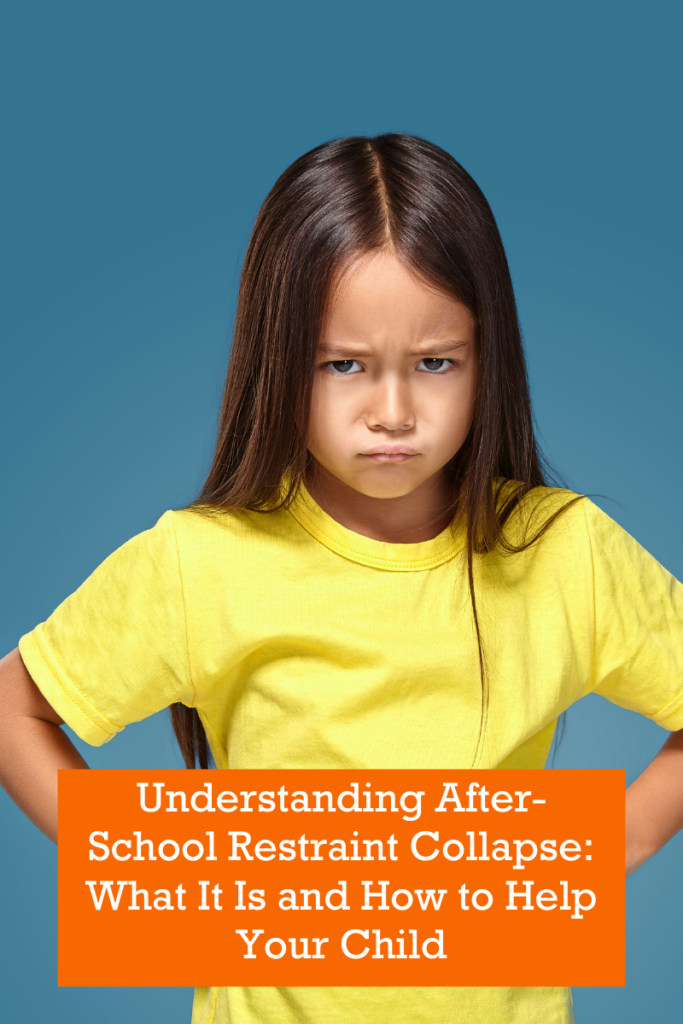If you’ve noticed your child melting down after school, despite seeming to have a great day in class, you may be witnessing something known as after-school restraint collapse.
This emotional unraveling is particularly common at the beginning of the school year, as children adjust to new routines, classroom environments, and expectations. The unfamiliarity and transition can heighten the emotional toll, making restraint collapse more likely during those early weeks.
This phenomenon is common and affects many families, but understanding it can make a significant difference in how you respond and support your child.

After-school restraint collapse refers to the emotional release children experience when they come home after a long day of school. Throughout the school day, children are often exerting significant effort to behave appropriately, follow instructions, and cope with various social and academic pressures. By the time they get home—where they feel safe and comfortable—the emotional “restraint” they’ve maintained all day can collapse, leading to meltdowns, irritability, or tearfulness.
This isn’t a sign that your child had a bad day at school. In fact, it’s often quite the opposite: it indicates that they’ve been holding in a lot of emotions and energy, and home is where they feel safe enough to release it.
The signs can vary from child to child, but some common indicators include:
Supporting your child through after-school restraint collapse requires patience and understanding. Here are some practical strategies families can use:
After-school restraint collapse is common among young children but can last into the pre-teen or even teen years, depending on the child. Factors such as personality, emotional regulation skills, and school-related stress all play a role in how long a child may experience this phenomenon. It’s essential to remain patient and supportive, understanding that this is a developmental phase that most children will grow out of as they learn to manage their emotions more effectively.
Children with learning differences, such as dyslexia or ADHD, are more prone to experiencing after-school restraint collapse. The effort required to focus, process information, and manage the sensory overload of a school day can be even more draining for these children.
By the time they come home, they may feel emotionally and physically exhausted, making it harder for them to keep their emotions in check. Additionally, children with ADHD might experience more frequent collapses due to difficulties with impulse control and emotional regulation.
While after-school restraint collapse is common, there are times when it may be beneficial to seek support from a mental health professional. Consider reaching out to a child psychologist, therapist, or counselor if:
Seeking help early can prevent these challenges from escalating and ensure your child is receiving the appropriate care to develop coping strategies for their emotions.
At Roberts Academy, we recognize the emotional and cognitive challenges that students face during the school day, especially those with learning differences like dyslexia. Our structured and supportive approach is designed to not only address academic needs but also to support students’ emotional well-being.
After-school restraint collapse is a normal, albeit challenging, part of many children’s lives. By creating a calm, supportive home environment and helping your child decompress, you can ease the after-school transition and foster emotional resilience.
This collapse is especially common at the beginning of the school year, as kids adjust to new schedules and expectations. However, with time and support, your child will develop the skills needed to manage their emotions more effectively. If the behavior becomes too intense or persistent, don’t hesitate to reach out for professional help—early intervention can make a significant difference in your child’s emotional well-being.
Discover Roberts Academy at Mercer University in Macon, Georgia!